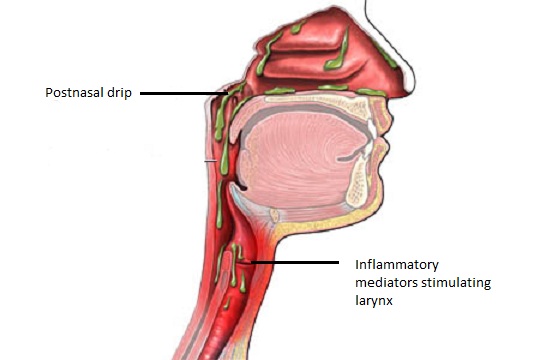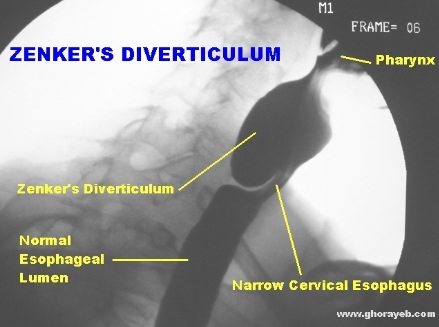Dysphagia
Dysphagia is difficulty eating due to disruption of the swallowing process
Differential diagnosis:
Vascular - Stroke
Inflammatory - GORD
Trauma
Autoimmune/allergy - Eosinophilic oesophagitis, scleroderma
Metabolic
Infective
Neoplastic - Barret's oesophagus, oesopheageal cancer, brainstem tumours
Congenital
Degenerative - Achalasia, Zenker diverticulum
Chronic cough
Cough that lasts more than 8 weeks
Aetiology
3 conditions account for ~95% of chronic cough:
1. Postnasal drip syndrome/upper airway cough syndrome (UACS)
2. Asthma
3. GORD
Be aware that a number of other conditions make up the remainder e.g. ACE inhibitor therapy, smoking, CHF, non-asthmatic eosinophilic bronchitis etc.
UACS - secretions containing inflammatory mediators stimulate pharyngeal and laryngeal sites -> cough
GORD - either via:
1. Distal oesophageal acid exposure that stimulates an oesophageal-tracheobronchial cough reflex via CN X
2. Microaspiration of acid to the larynx/trachea (laryngopharyngeal reflux) this is most often silent i.e. patients do not get heartburn
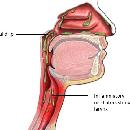
Postnasal drip
|
|
|
|
|
Investigation and Management
For this presentation history has very little yield for diagnosis
UACS
Treat any underlying sinusitis, avoid allergens
Hallmark of this syndrome is the lack of pathognomonic findings - diagnosis made by response to:
Chronic Rhinosinusitis treatment (see Rhinology section)
NB: response may take weeks to months
Non-asthmatic eosinophilic bronchitis
Diagnosis made by induced sputum showing increased eosinophils
Highly responsive to inhaled corticosteroids
GORD
Treated with PPI e.g. omeprazole
Therefore investigation should proceed with:
- Stop smoking and other factors e.g. ACE inhibitor therapy (response may take one month)
- Chest XR - to rule out pulmonary lesions
- Trial GORD treatment
- CT sinuses
- Induced sputum
- If the above show no yield then more extensive investigation required: sputum for TB, HRCT, bronchoscopy
Globus
Globus is a persistent or intermittent painless sensation of a lump or foreign body in the throat
Aetiology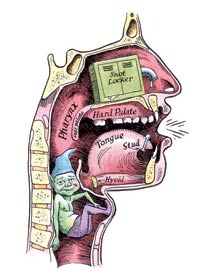
GORD - accounts for ~25 to 50% of patients
.
Non-specific oesophageal motility disorder
.
Malignancy
.
Psychological/stress
.
Others: retroverted epiglottis, thyroid disease, TMJ dysfunction etc.
.
.
.
Investigation and Management
Like with chronic cough, the history is low yield but should be used to evaluate for malignancy, reflux & psychological factors
Full ENT exam including laryngoscopy - to exclude malignancy + other causes
3 month trial of PPI therapy (e.g. omeprazole)
If unresponsive to PPI then further Ix: 24 hour pH monitoring, endoscopy and barium swallow
If above negative consider: psychiatry input
If suspicious findings on history, exam or laryngoscopy then more aggressive investigation is needed
Pharyngoesopheageal diverticulum (Zenker diverticulum)
The herniation of the posterior pharyngeal/oesophageal mucosa and submucosa due to increased intraluminal pressure. Either due to lack of coordination of musculature or a hypertensive upper oesophageal sphincter
History
Dysphagia
Regurgitation of undigested food from the pouch - with risk of aspiration
Halitosis
Investigation
Barium swallow
Fibreoptic endoscopic evaluation of swallow
+/- pH monitoring to assess for associated GORD
Zenker diverticulum
|
|
|
|
|
Management
Transoral endoscopic treatment with CO2 laser or electrocautery is becoming standard
Open neck approaches are also still performed

Edit page 







